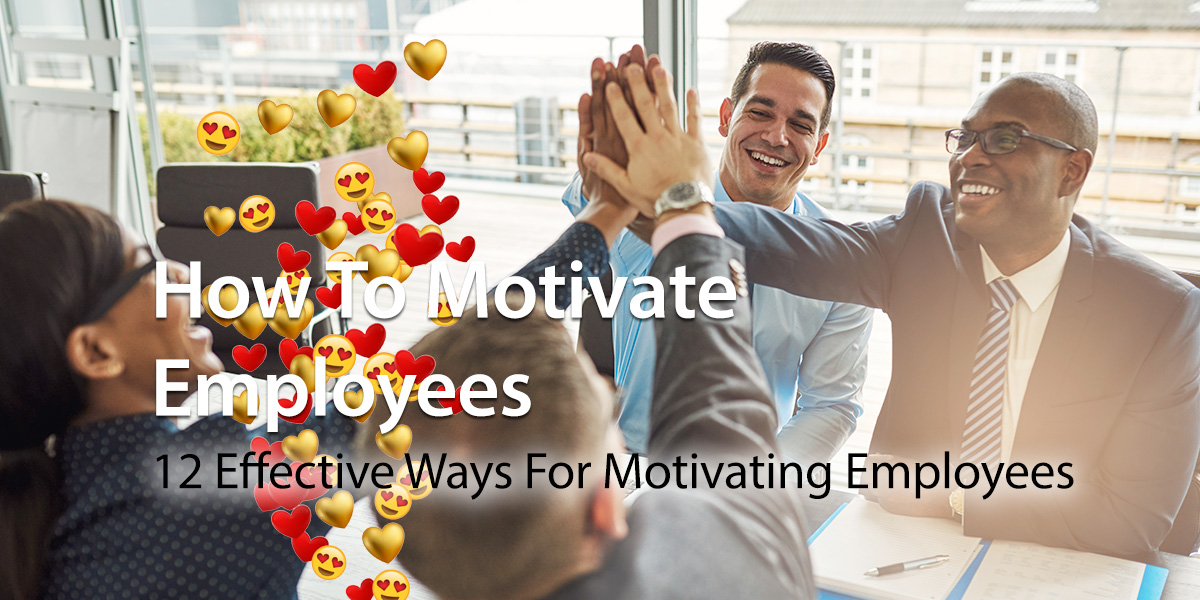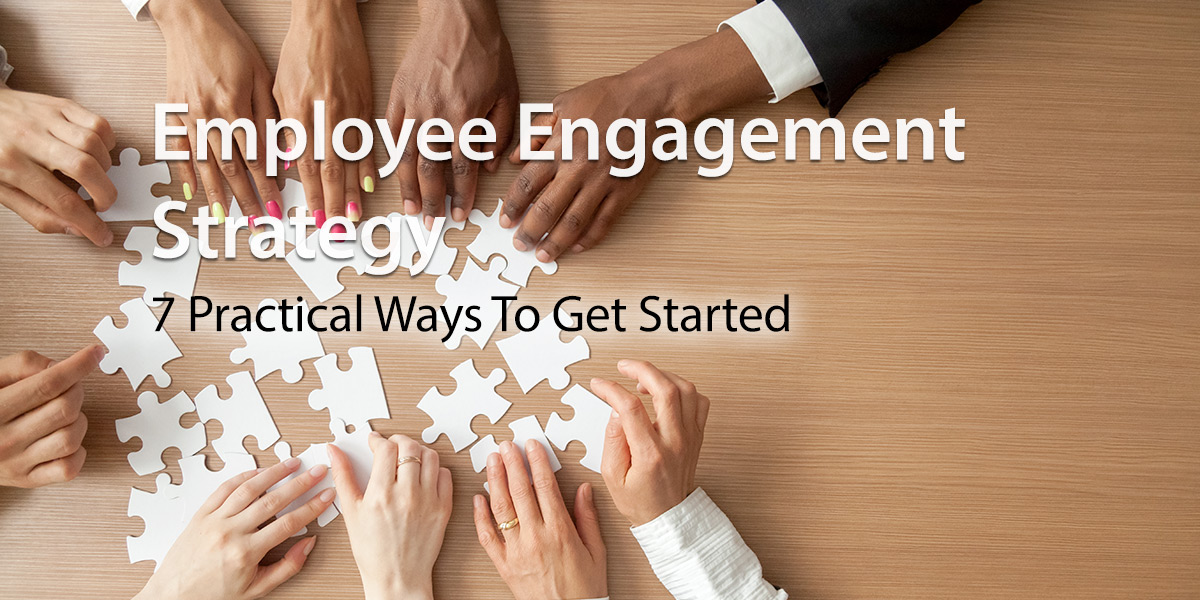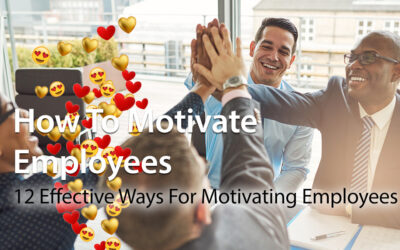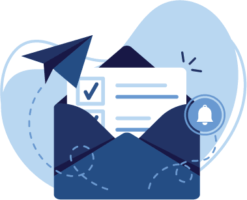If your organization is serious about making a real difference to employee engagement, an action plan is perfect for getting started. Less than one-third of US workers feel engaged in the workplace, and the time to act is now. Businesses with high engagement report lower absence rates, improved staff morale, and retention, plus increased productivity and greater profitability. There’s no mistaking the critical message: Employee engagement is good for business. But how do you go about raising the bar in your business? An action plan can make a difference. It raises the profile of employee engagement, focuses your efforts, and holds you accountable for delivery.
In this post, we look in detail at what’s involved. Topics covered include the following:
- How to create an employee engagement action plan
- Top 6 drivers of employee engagement
- Quick wins to kickstart the improvement process
- Tips on writing targets and goals
- Success measurements and keeping track of progress
And for an added bonus, we include a downloadable employee engagement action plan template.
How To Create An Employee Engagement Action Plan
Getting started on your action plan can feel overwhelming. Where do you begin? Breaking things down into bite-sized chunks makes any task more manageable. Here are five simple steps to get your strategy off the ground:
- Conduct employee surveys to gather insights about where you are at and areas for improvement
- Understand the key drivers for employee engagement
- Develop a collaborative action plan
- Identify quick wins to give your program some momentum
- Ask for feedback and monitor progress
When it comes to identifying priorities, what better way to start than by asking your workforce? Many companies already conduct annual staff opinion surveys. But it’s surprising how many do nothing with the data. According to some research, failing to act on feedback is worse than doing nothing in the first place.
And because employee engagement is a marathon and not a sprint, it’s essential to check in with staff regularly. Annual surveys may not give you the rich ongoing data you need. Nowadays, the best practice is to conduct shorter, more frequent snap polls and pulse surveys. That way, you can more easily refine your strategy as you go. Check out our blog on employee surveys for all you need to know.
Top 6 Drivers Of Employee Engagement
The next step is to develop an understanding of what drives employee engagement. Every worker is different. However, the following top six drivers are common to the vast majority of organizations. When it comes to identifying activities, ticking these boxes will go a long way to driving engagement.
Gallup has undertaken extensive research into employee engagement drivers. And it’s not all about a good paycheck. Here are the top six drivers of employee engagement:
- Purpose
- Development
- A caring manager
- Ongoing conversations
- A focus on strengths
- Work-life balance
The bottom line is your people want their work to have purpose and meaning. They need a good relationship with a manager who understands their strengths and supports them in developing their skills. And they want to be part of the conversation. Top-performing organizations involve their staff with two-way communications.
Develop A Collaborative Action Plan
Once you have the survey data and understand the key drivers, the next step is developing an action plan. Make it a collaborative process, and you increase your chances of success. Involve as many employees as possible in working up the detail so they have buy-in to the process. Here are some ideas on how to get your people involved:
- Managers are best placed to identify issues and solutions in their teams. Ask for their views in a focus group, via an intranet blog, or webinar.
- Set up focus groups on target areas. Let’s say your survey uncovered that your people feel undervalued. A cross-departmental working group can identify challenges and brainstorm solutions.
- Involve senior executives involved in the conversation. The commitment to improving employee engagement must come from the top. So, make sure the senior leadership team has an input.
Employee Engagement Action Plan: Possible Activities
Putting pen to paper or finger to keyboard is the hard part. Here we make it easier by suggesting some key actions to implement. These are based on current best practices and will address several of the vital drivers we identified earlier.
It’s a good idea to include some quick wins that don’t require a huge budget. These will be important in kickstarting employee engagement and underscore your commitment to improvement for workers. However, you should try to balance short-term quick wins with longer-term projects.
Let’s begin with some quick wins before identifying longer-term initiatives.
Employee Engagement Activities: Quick Win Solutions
- Implement regular employee engagement surveys to benchmark and track progress.
- Set up a cross-departmental action group.
- Invite employees to submit ideas or suggestions for improvements via an online form.
- Set up an intranet-based employee engagement blog where workers share ideas and insights with managers and colleagues.
- Conduct snap polls about specific issues, job roles, or locations within the company to gather data outside your primary employee engagement surveys.
- Set up a series of team-building activities and events to improve morale.
- Implement a company-wide staff recognition scheme.
- Develop online employee profiles with photos and biographies.
Longer Term Employee Engagement Projects
- Improve internal communications with two-way channels to ensure your people are involved and informed.
- Review performance appraisal systems so personal objectives are more closely aligned to organizational priorities.
- Provide a training program for managers on how to promote engagement in their teams.
- Develop a set of employee engagement success metrics to track progress.
Employee Action Plan Template
So, now we have some key action points, let’s turn our attention to the employee engagement action plan. Preparation is crucial to the successful implementation of engagement initiatives. But what does an effective action plan look like? Well, certain elements are common across all the best action plans. These include:
- identifying areas for improvement
- proposed solutions
- success measures
- ownership
- timeline for completion.
Here’s a template that you can adapt to your own organizational needs. Download a Microsoft Word version of the employee action plan template here: employee-plan.docx
| Area for Improvement | Proposed Solutions | Success Measures | Ownership | Timeline for Completion |
How To Complete An Employee Engagement Action Plan
When it comes to completing the template, it’s essential to identify action points, projects, and initiatives. You also should assign key roles and responsibilities. The action plan will help you measure progress. And it ensures individual staff members and the organization as a whole are held accountable.
In the example below, we have made a start on completing the template to give you a feel for the required level of detail. The most crucial point here is that solutions and success measures should be SMART goals. This means they are specific, measurable, achievable, relevant, and time-bound. Check out our post about employee engagement goals to help with this process. You will find some sample goals included to get you started.
Individual goals should be easy to understand, well-defined, and meaningful to anyone involved. Vague or poorly defined targets rarely hit the mark. However, specific, measurable targets make it clear when you have completed the task. They also allow you to track progress and adjust things along the way. And those responsible for delivery are held accountable.
Furthermore, make sure your objectives are achievable. While it’s great to be ambitious, you also need to keep an eye on what’s practical. Best practice targets tend to have a practical focus and are clearly linked to overall goals. And include a ‘by when’ date to increase the chances of successful completion. Otherwise, it’s easy for tasks to get buried under the day-to-day distractions that can get in the way.
And limit your goals to a few key initiatives. The more you have, the less likely you are to achieve them. Instead, concentrate on a few key initiatives at a time. Remember, employee engagement is an ongoing process, and you don’t have to get everything done at once.
Employee Action Plan Example
Below is an example of a completed employee action plan that sets out the action points we identified earlier. We have used the following principles to guide our target setting:
- Clear, concise goals
- Success measures so you can assess how well you have done
- Accountability, so it’s clear who is responsible for what
- Firm time frames for completion.
Download a PDF version of the employee action plan example here: employee-engagement-action-plan.pdf
| Area for Improvement | Proposed Solutions | Success Measures | Ownership | Timeline for Completion |
| Implement an employee engagement strategy | Appoint a contractor to develop a survey or develop the survey in-house | Comprehensive employee engagement survey is developed & published | Board to decide on delivery method
HR Manager to oversee |
Board decision by end of quarter 1
Employee engagement survey launched by end of quarter 3 |
| Set up a cross-departmental action group
|
Action group membership to be drawn from across departments & job roles & chaired by board member | Action group is set up with terms of reference to oversee action plan & survey | Board member with HR responsibility | First meeting of action group by end of quarter 1 |
| Invite employees to submit ideas for improvements via online form | Develop online ideas form for publication via intranet | Over time, increasing numbers of staff contributing ideas to management & the action group | IT Manager to develop
Action group to follow up on ideas submitted |
Online form available on intranet by end of quarter 1
|
| Set up an employee engagement blog on the intranet for staff members
|
Staff can contribute & share ideas & insights via an intranet-based employee engagement blog | A popular intranet blog with lively, interesting debate across all departments | HR Manager to set up & moderate
Blog to be sponsored by CEO to encourage participation |
Blog up and running by end of quarter 2 |
| Conduct intranet mini surveys in relation to specific issues, job roles or locations within the company to gather information & data outside the main employee engagement survey | Intranet surveys conducted on an as and when basis, for example, when conducting review of internal communications | Minimum 65% staff participation rate in ad hoc intranet surveys | All managers to utilize this tool when needed | Action group to review the use & effectiveness of ad hoc surveys by end of quarter 4
|
| Set up a series of team building activities and events to improve team spirit and morale
|
Managers to canvas teams for ideas. Two events to be held per annum, timing to suit team members | Increase in percentage of staff reporting improved team spirit in annual or ad hoc survey | Team manager to implement
HR manager to oversee |
Two events held per team by end of quarter 3
Action group to review impact following survey results by quarter 4 |
| Implement a company-wide staff recognition scheme
|
Ask staff how they’d like to be recognized in an intranet survey & hold focus groups with highest participation rate
Develop and launch company-wide employee recognition scheme following staff consultation |
High rate of participation in the intranet survey (75% or above)
Focus groups held and feedback given to the action group
Reward system is in place to recognize & reward high performance
Reduction in percentage of staff reporting that the organization does not recognize or reward staff efforts in annual survey |
Operations Manager to set up an intranet survey for all staff
Relevant team managers to hold focus groups with teams that highest participating teams for more in-depth feedback to the action group
HR Manager in partnership with the action group to develop detailed program |
Intranet survey set up by end of quarter 2
Focus groups arranged and feedback provided to the action group by end of quarter 2
Company-wide employee recognition program in place by end of quarter 3 |
| Develop an internal employee directory with photos and biographies | Use the intranet tool to create online staff directory that employees can edit | Fully functioning online directory available for staff | Operations Manager in partnership with IT | Directory to be live by end of quarter 2 |
| Improve internal communications to ensure staff are involved and informed | Institute system of weekly team briefings for two-way relaying of information between managers and staff
Relaunch the intranet’s news feed and make it the intranet’s home page |
Reduction in percentage of staff citing poor communications as an issue in the annual engagement survey
95% of staff members logging into the news feed on a daily basis |
Operations Manager to brief all team managers
Communications & Marketing Manager |
System to be in place by end of quarter 1
Chart progress against intranet usage statistics on a monthly basis |
| Review staff performance appraisal systems to ensure personal objectives are closely aligned to organizational priorities | HR Manager to review current systems so that personal objectives relate directly to organizational priorities | Managers are developing objectives that link directly to business priorities
Staff have clearer understanding of how they contribute to the bigger picture as evidenced by improved scores in the annual engagement survey |
HR Manager to oversee
All managers to implement |
Review to be completed by end of quarter 1 2019
New appraisal system in place by end of quarter 3 2019 following manager training program |
| Provide training program for managers on how to facilitate engagement | Managers trained in & given responsibility for engagement within their teams | All managers trained in facilitating employee engagement
Increase of 10% in staff reporting that their manager supports and values staff input in annual engagement survey |
HR Manager to oversee supported by action group | HR Manager & action group to report on possible program & delivery methods by end of quarter 2 2019
Program implemented by end of quarter 4 2019 |
| Develop set of employee engagement metrics to track progress | Employee engagement survey data to be supplemented with additional metrics such as:
– ad hoc surveys – staff turnover data – sickness & absence rates – exit interview data |
Metrics monitored by board & action group every 6 months
Improving trends apparent in comprehensive dataset |
HR Manager to develop in partnership with action group | Agreement on data set by end of quarter 1 2019
Data collected & analyzed by board & action group every six months thereafter |
Review Mechanisms
Once you’ve completed your action plan, set up regular review mechanisms. Follow-up is critical to success as that’s how you ensure you deliver on your commitments.
And the stakes are high. Employees will watch your progress and be keen to see some real action. Your organization’s credibility is on the line, and review mechanisms help you monitor progress and deliver on your promises.
Identify Success Measures
If you want to improve continuously, then you also need success measures. Your action plan has identified measures of success for specific activities. But you also need to monitor how well you are doing overall.
Employee surveys undoubtedly provide rich data that you are moving in the right direction. However, here are some other metrics to consider.
Employer Net Promoter Score (eNPS)
This measures how likely your workforce is to recommend you as an excellent place to work. All you need to do is ask staff the following question: On a scale of 0-10, how likely are you to recommend us to your family and friends as a great place to work? A high eNPS of eight and over means your people are happy and motivated. The eNPS is simple to understand and implement as it involves just a straightforward question. You can benchmark your performance over time or compare yourself to the competition.
Employee Absence And Retention Rates
It’s no secret that engaged employees regularly show up for work and tend to stick around longer in the job. And so, absence and retention rates reveal a lot about the state of employee engagement. You will know your efforts are bearing fruit when absence rates decline and retention improves.
Customer Satisfaction
Happy employees should equal happy customers. Keep an eye on your customer satisfaction data to track any concerning trends. For example, a poor customer net promoter score could be a red flag for low employee engagement.
Productivity And Profitability
This is perhaps the metric that really counts. Research shows an engaged workforce is a productive and profitable one. So, if sales are decreasing, productivity is declining, and the bottom line takes a dip, poor employee engagement could be to blame.
Communicate Your Plan To Employees
Now that you have this well-thought-through collaborative action plan, it’s time to spread the good news. Let all stakeholders know about the program through your usual internal communication channels. Keep workers updated on what’s happening and celebrate all your achievements. Your engagement rates will skyrocket if the workforce feels involved and informed and can see tangible results.
Employee Engagement Action Plan: It’s Time To Act
The Great Resignation is continuing to impact businesses worldwide. And so, the time to act on employee engagement is now, or you risk falling behind the competition. Use the ideas in this article to set the ball rolling in your company.
FAQs
What is employee engagement?
Employee engagement is the emotional connection your people feel towards the organization, its values, and its goals. For engaged employees, it’s not just about the paycheck or next promotion. They are driven to go above and beyond because they closely identify with your mission and values. Check out our ultimate definition for more.
Why is employee engagement so important?
Engaged employees are happier, more motivated, and give their best every day. The effects ripple through all aspects of your business. An engaged workforce makes a difference from productivity and profitability to customer satisfaction. Nowadays, employee engagement is more critical than ever. Retention is at an all-time low, and workers are leaving in droves, thanks to the Great Resignation. Engaged employees have a greater sense of attachment to the organization, making them more likely to stay put.
What is an employee engagement action plan?
It’s a detailed program of activities designed to improve employee engagement. It provides a roadmap for driving engagement. The plan identifies the how, what and when and holds the organization accountable for delivering.
What are the actions that improve employee engagement?
Improving employee engagement is an ongoing process. There’s no one action you can take to increase your rates overnight. Instead, it’s a series of activities that, taken together, address the key drivers of employee engagement leading to improvement over time.
How do you develop an employee engagement action plan?
The process will vary from company to company. Most start with an employee survey to identify priority areas for action. Next, SMART goals and targets are developed to address the priority areas. Finally, success measures are identified to monitor how well you are doing. A collaborative approach that involves all staff works best. That way, you have employees invested in the program’s success.
About MyHub
We are a leading provider of intranet solutions to many businesses across the globe. Easy to set up, our beautifully designed intranets are helping organizations just like yours to increase employee engagement. Under one virtual roof are all the tools you need to drive employee engagement. Book a no-obligation demo or 14-day free trial and see what a difference our platforms can make to your business.











0 Comments